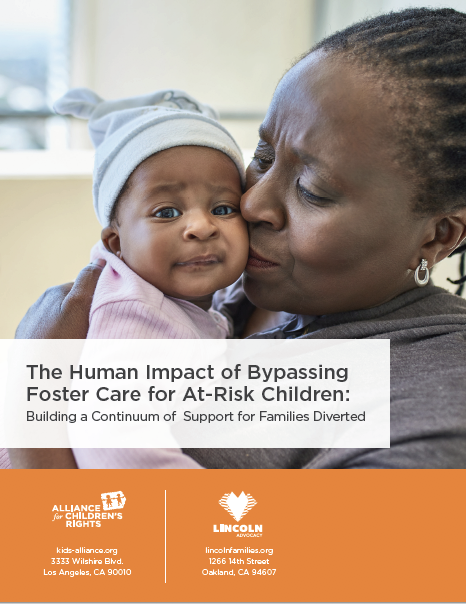This report looks into the adverse impacts of Hidden Foster Care.
Due to a well-intentioned effort to ”keep kids out of the system,” relatives are frequently encouraged to bypass juvenile court and care for at-risk children outside of formal foster care – often these families end up without the supports and services necessary to address the impacts of trauma.
Hear the Stories of Caregivers Impacted by Hidden Foster Care:
In partnership with Lincoln, we brought kin caregivers and experts together to activate dialogue around the adverse impacts of Hidden Foster Care at our Northern California Policy Summit. This recap video from the summit shares personal stories from caregivers and debuted for our Caregiver Council in February 2020.
“The father is incarcerated, the mother left and never returned, so I filed a missing person report. I was told if I didn’t get guardianship she would go to CPS/Foster Care.”
In early 2019, the Alliance for Children’s Rights and Lincoln partnered to explore the scope of issues created when child welfare professionals bypass juvenile court for children at risk of entering foster care. This occurs when relatives are identified and encouraged to care for the child outside of foster care or to petition for probate court guardianship, resulting in a hidden foster care system. The goal of the project is to develop a set of recommendations and strategies to provide diverted families greater access to information, supports, and services to promote systemic changes to meet families’ need. These issues were approached holistically: we endeavored to seek and understand the impacts on children, parents, and caregivers and develop recommendations that account for the needs and rights of everyone.
Over the course of 2019, we conducted a series of focus groups and surveys in order to engage various stakeholders including diverted families, child welfare workers, kinship service providers, minors’ and parents’ counsel, and social services agency staff across California. In addition, we reviewed literature and studies focused on this population. Our goal is to understand how diversion from the child welfare system occurs and the impact of diversion practices on all involved in the chain: the children and parents, the relatives and non-related extended family members who care for the children, and the professionals dedicated to serving the children and families.
Specifically, the focus groups and surveys were intended to solicit the experiences of those impacted by diversion practices and their insights on what improvements could be made to the process to better support children and their families. Through the focus groups’ discussion and survey input, the Alliance and Lincoln gathered information to help service providers and policy makers to address significant impacts in the following areas:
- Supporting Children and Families: Ensuring Available Supports and Resources
- Avoiding Legal Limbo and Safeguarding Children While Promoting Family Choice
- Tracking Our Progress and Moving Toward Holistic Reform
The report summarizes the focus group discussions and survey information and includes selected quotes from participants illustrating the recurring themes. Moreover, the report distills the information from the lived experiences of families and service providers in the hidden foster care system and incorporates recent research and policy analysis in the form of recommendations to better support children and families.


